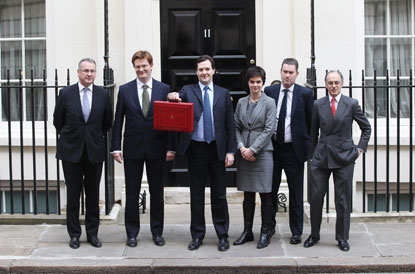By Richard Johnstone | 26 March 2012
The interest rate cut for some local authority borrowing could scupper councils’ plans to issue bonds to raise funds for infrastructure projects, Public Finance has learned.

Chancellor George Osborne’s Budget on March 21 revealed a reduction in the Public Works Loan Board interest rate on loans for councils that provide ‘improved information and transparency’ on ‘borrowing and associated capital spending plans’.
The rate would then be reduced by 20 basis points from the current rate of 1% above central government’s own borrowing to 0.8% above gilts from 2012/13, a Treasury source said. This would apply to counties, London boroughs, districts and metropolitan and unitary authorities.
The planned reduction comes as the Local Government Association examines plans to create a municipal bonds agency to borrow from the market and then lend to councils.
More details on the LGA’s plans are expected later this year, but the Treasury source said the government was looking to reach agreement on how borrowing could be provided at even lower rates using an ‘independent body’. This would build upon the LGA’s proposals, but not involve bond issues. However, councils would remain ‘free to borrow in whatever way they wish’, the source added.
The LGA said it is now ‘seeking a meeting as soon as possible’ over the proposal. A spokesman insisted a bonds agency is ‘something we are committed to pursuing’. He said: ‘There’s still very much a taste within the sector to push ahead with examining local government bonds. We do want to go to the market because we do have an exceptional credit rate, which will free us up from the whims of the Treasury.’
It was thought that such a fund could be cheaper as long as the PWLB remained consistent. The LGA had called for the Budget to remove barriers to bond issues, such as tax regulations that would discourage foreign investors.
Cutting the PWLB rate will make it ‘much more difficult’ for authorities to diversify their funding in an attempt to fill the funding gap caused by government cuts, PF has been told.
Chris Hearn, head of local authorities at Barclays, who has advised a number of councils considering bonds, said the rate cut would ‘make the bond market less attractive to local authorities’.
He added: ‘From a financial point of view it does make it more difficult to justify, I would have thought. At those sorts of margins, the bond market will be above that price. We have seen moves up and moves down, and it’s difficult to know what’s driving that. Local authorities want options for borrowing for their infrastructure programmes when they need to.’
Liam Scott-Smith, head of external affairs at the New Local Government Network think-tank, said council bond issues were now likely to be delayed.
‘At first the government seemed quite keen on [bonds] and is now doing an about-turn,’ he said. ‘I think the government is happy to have a degree of uncertainty about this just now. It’s quite clear from their decision that they don’t want local government to be doing anything too radical.’
There would likely be at least ‘a 12-month bond issue delay as a result of this’, he added.
The Budget also confirmed that the government intends to push ahead with the development of Tax Increment Financing schemes in eight cities across England, including Manchester, where an expanded ‘earn-back’ model was announced.
However, LGA chair Sir Merrick Cockell said that the announcement of £150m of earmarked Tif funding for the core cities would only ‘help get a very small number of projects off the ground… [and] could be limited to -helping just one’.
The ‘groundbreaking’ city deal struck with Greater Manchester will support £1.2bn of infrastructure investment across the city region, Osborne said.
This will include an ‘earn-back model’ where an element of tax revenues raised – either as corporation tax from firms working on construction or from new businesses paying business rates – would be retuned for further investment.
The Department for Communities and Local Government said that the 30-year deal would return a maximum of £30m annually to the city once revenues pass a certain threshold.
Neil McInroy, chief executive of the Centre for Local Economic Strategies, said the Manchester deal was an ‘interesting’ agreement and ‘the first example of something that needs to be extended to other areas and other cities’.





















